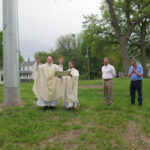(Editor’s note: Sister Johanna Rickl, CHM, wrote the following guest editorial.)
“If we have no peace, it is because we have forgotten that we belong to each other.” These words by St. Teresa speak to our amnesia of our interconnectedness. The fact is that our lives are intertwined in a myriad of ways. Liberals and conservatives, Trump supporters and impeachment advocates, the rich and the poor — we all breathe the same air, depend on the same economy and eat food from the same Earth. I am a Catholic religious sister, and my faith keeps me hopeful that we will regain our sense of togetherness. I have come to see that climate change, which has been one of our more polarized issues, is now a reality that is catalyzing a common purpose among us.
We saw the community come together amidst the horrendous flooding last spring, when neighbors looked out for one another and a crowd of volunteers in Davenport filled over 10,000 sandbags to protect our city. We are going to need to keep working together. The U.S. Department of Agriculture’s climate director, Dennis Todey, recently stated, “the projections are that more and bigger rainfalls are going to continue.” Climate change produces more extremes, including heavier downpours, since warmer air holds more water to dump on us. Other climate-related impacts that will continue to harm Iowans include the tripling of the number of Lyme disease cases in the U.S. over the past couple decades and the growing prevalence of asthma and allergies.
The public is increasingly clear about the threat posed by climate change. Seventy-six percent now see climate change as a crisis or major problem — up a surprising 17 percent over the past five years — according to a recent Kaiser Family Foundation-Washington Post poll. We can and must turn this concern into action together to both treat the symptoms of climate change and prevent further climate disruption through policy and conservation. We must remain hopeful, even while our politicians fail us. Pope Francis, in his major teaching document on ecology “Laudato Si,” said, “For all our limitations, gestures of generosity, solidarity and care cannot but well up within us, since we were made for love.”
We are all connected. The $2 billion in losses to the farming community because of the spring flooding reverberates out to harm the economic standing of all of us. The good news of our interconnectedness is that our positive works ripple forth as well. As I was recently quoted at a prayer breakfast hosted by Bishop Thomas Zinkula in Davenport, “We will flourish together or perish together.”
Recently, our congregation of religious sisters legally protected land near Our Lady of the Prairie Retreat through a conservation easement. We aim to improve the health of the Wapsipinicon River and create better habitat for many different plants and animals, in addition to capturing carbon. More benefits ripple forth. The prairie grasses and flowers offer opportunities for bees, butterflies and other insects to do their important work in human food production. The land will help preserve a quiet setting for more effective retreats and contemplative experiences for people seeking to nourish their relationship to self, God and others. The solar panels installed at the retreat center and at the Franciscan Sisters’ home in Clinton reduce our carbon emissions; they also lower electrical costs, enabling us to put more resources into our charity work.
The solar panels remind all who come through to be more aware of ways each of us can conserve energy and protect our common home.
Each of us is part of the web of life and not separate from it. We do not exist in isolation but are in relationship with all life on Earth. From the perspective of the Christian Gospel, all humans are children of the same Creator, brothers and sisters equal in worth and loved into existence by a God who is Love. Our stewardship of God’s creation is a moral action that protects our children and grandchildren and vulnerable people everywhere. Pope Francis asks a foundational question: “What kind of world do we want to leave to those who come after us, to children who are now growing up?”
Our greatest advances as a country have come when we stared down our greatest challenges, including ending slavery, World War II and civil rights. Now the climate crisis looms before us, touching each of our lives. We are starting to see just how interconnected we are on this small planet. I believe in God’s extraordinary care and assistance for us. Perhaps even more extraordinary: I believe in us. Despite our political divisions, I believe we will find more and more capacity to care for one another. By bursts of love, and sometimes by stark necessity, I believe we will create common purpose to save our common home.
(Sister Johanna Rickl, CHM, is vice president of the Congregation of the Humility of Mary, based in Davenport.)












Johanna, your reflection touched my heart and soul. As St. Theresa said, “we belong to one another.” Two of my spiritual mantras in recent years has simply been “we are one.” Chief Seattle also spoke of how we are “all a part of the Web of Life.” How we relate and open ourselves to learn more about our oneness amidst our diversity makes a difference in how we live and die.